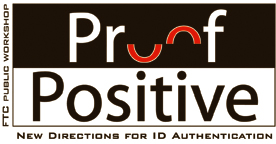On April 23 and 24, 2007, the Federal Trade Commission will host a public workshop, Proof Positive: New Directions for ID Authentication, to explore the role of authentication processes in preventing identity theft. The workshop will provide a forum for discussion among public sector, private sector, and consumer representatives about better ways to authenticate the identities of individuals. The workshop will focus on technological and policy requirements for developing better authentication processes, including the incorporation of privacy standards and consideration of consumer usability.
- Agenda [PDF]
- Webcast
- Welcome by Chairman Deborah Platt Majoras
Panel 1 & 2
[Transcript]
[WindowsMedia] [RealMedia] - Panel 3
Establishing Identity
[Transcript]
[WindowsMedia] [RealMedia] - Panel 4
Authentication Technologies
[Transcript]
[WindowsMedia] [RealMedia] - Panel 5
Implementing Authentication Technologies
[Transcript]
[WindowsMedia] [RealMedia] - Panel 6
New Applications and Upcoming Challenges in Authentication
[Transcript]
[WindowsMedia] [RealMedia] - Panel 7
Next Steps: Where do we go from here?
[Transcript]
[WindowsMedia] [RealMedia] - Participant Biographies [PDF]
- Press Release (February 21, 2007)
- Public Comments
- Federal Register Notice [PDF]
- Directions to the Conference Center
- Hotel information
- Nearby Restaurants
BACKGROUND MATERIALS
The views expressed in these background materials represent the views of the authors alone. They do not represent the views or opinions of the Federal Trade Commission or any individual Commissioner.
- Additional Presentations
- Panel 7:
Jeffrey Friedberg, Chief Privacy Architect, Microsoft [PDF] - Break Out Session B:
Gerald Beuchelt, Web Services Architect, Sun Microsystems [PDF]
Mike Jones, Director of Connected Systems Customer Strategy & Evangelism, Microsoft [PDF]
Paul Trevithick, Co-Founder, SocialPhysics.org, CEO, Parity Communications [PDF]
- Panel 7:
- Privacy Principles for Identity in the Digital Age by the Center for Democracy and Technology [PDF]
- Identity Policy: Risks and Rewards by Simon Davies and Gus Hosein [PDF]
- Electronic Safety and Soundness: Securing Finance in a New Age [PDF]
- Authentication and Government-Issued Digital Credentials [PDF]
- Internet Fraud Battlefield [PDF]
-
IBG BioPrivacy Initiative
FILING A COMMENT — Deadline: May 25, 2007
The Commission invites interested persons to submit written comments on issues related to this workshop. Studies, surveys, research, and empirical data are especially useful. For more information see http://www.ftc.gov/os/2007/02/authenticationfrn.pdf. Comments should be captioned “ID Workshop – Comment, P075402” and must be filed on or before May 25, 2007.
- To File Electronically:
- Click on the following Web link: https://secure.commentworks.com/ftc-idmworkshop and follow the instructions on the Web-based form.
- To File in Paper Form:
- Include “ID Workshop, P075402,” both in the text and on the envelope and mail or deliver to the following address: Federal Trade Commission/Office of the Secretary, Room H-135 (Annex N), 600 Pennsylvania Avenue, N.W., Washington, D.C. 20580. Because paper mail in the Washington area and at the Commission is subject to delay, please consider submitting your comments in electronic form, as prescribed above. The FTC is requesting that any comment filed in paper form be sent by courier or overnight service, if possible.
- To Request Confidential Treatment:
- You must file in paper form and clearly label the first page of the document with “Confidential” and comply with Commission Rule 4.9(c).*
- FTC's Privacy Policy:
- The FTC Act and other laws the Commission administers permit the collection of public comments to consider and use in this proceeding as appropriate. All timely and responsive public comments, whether filed in paper or electronic form, will be considered by the Commission and will be available to the public on the FTC Web site, to the extent practicable, at http://www.ftc.gov/os/publiccomments.htm. As a matter of discretion, the FTC makes every effort to remove home contact information for individuals from the public comments it receives before placing those comments on the FTC Web site. More information, including routine uses permitted by the Privacy Act, may be found in the FTC’s privacy policy, at http://www.ftc.gov/ftc/privacy.htm.


